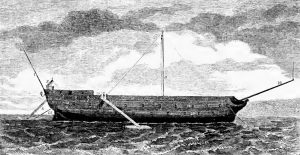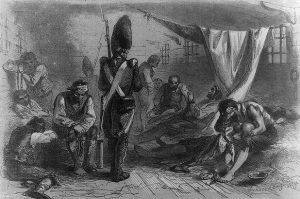 I am sometimes amazed at the ability of humans to be heinously cruel to other human beings. From murders, to slave owners, to prisons or prisoner of war camps, man has the ability to act out evil in its purest form. Still, one would not have expected such evil in the American Revolutionary War era. Well, one would be wrong. We all know that war is a horrific event, but worse than losing life and limb in battle, seems to be the fate faced by those who are captured by the enemy forces, only to be tortured and even killed.
I am sometimes amazed at the ability of humans to be heinously cruel to other human beings. From murders, to slave owners, to prisons or prisoner of war camps, man has the ability to act out evil in its purest form. Still, one would not have expected such evil in the American Revolutionary War era. Well, one would be wrong. We all know that war is a horrific event, but worse than losing life and limb in battle, seems to be the fate faced by those who are captured by the enemy forces, only to be tortured and even killed.
During the Revolutionary War, being captured by the British often meant being sent to a prison ship, the worse of which was the HMS Jersey. Over the years of the war, approximately 11,000 prisoners of war perished on the HMS Jersey. The number of American field casualties during that war was approximately 4,500. That is a stunning difference. The HMS Jersey often held thousands of prisoners at one time, in quarters that were so close, that it could be likened to being packed in like sardines in a tin. There was no light, no medical care, barely any oxygen, and very little in the way of food and clean water. The guards on the prison ships were not concerned with keeping their prisoners alive, and HMS Jersey was the worst of them all.
The little food the prisoners were given was moldy, putrefied, and worm infested. The prisoners had to choose daily to eat the horrible food, or starve. One prisoner Ebenezer Fox, who survived said, “The bread was mostly mouldy, and filled with worms. It required considerable rapping upon the deck, before these worms could be dislodged from their lurking places in a biscuit. As for the pork, we were cheated out of it more than half the time, and when it was obtained one would have judged from its motley hues, exhibiting the consistence and appearance of variegated soap, that it was the flesh of the porpoise or sea hog, and had been an inhabitant of the ocean, rather than a sty. The provisions were generally damaged, and from the imperfect manner in which they were cooked were about as indigestible as grape shot.” That pretty much says it all, I would say. The British soldiers were seemingly unaffected by the image of prisoners banging their biscuits against the deck to remove worms, because this treatment continued throughout the conflict.
Because the prisoners were kept at sea, the smell of a piece of dirt from the shoes of a soldier back from shore leave became one of the prisoners’ greatest delights. I guess that one can always find some good, even in the worst situations, if one looks for it. Captain Dring, a survivor who wrote prolifically about his experiences on the Jersey, recalled one particularly strange consolation. When someone died on the ship, their remains were usually thrown overboard, but occasionally they were allowed to be taken ashore and laid to rest. Dring was part of a group that was tasked with digging graves on land. The men chosen for this duty were ecstatic to be on land again. Dring even took off his boots simply to feel the earth underneath his feet. However, when the crew came across a piece of broken-up turf, they did something extraordinary: “We went by a small patch of turf, some pieces of which we tore up from the earth, and obtained permission to carry them on board for our comrades to smell them. Circumstances like these may appear trifling to the careless reader; but let him be assured that they were far from being trifles to men situated as we had been. Sadly did we approach and reenter our foul and disgusting place of confinement. The pieces of turf which we carried on board were sought for by our fellow prisoners, with the greatest avidity, every fragment being passed by them from hand to hand, and its smell inhaled as if it had been a fragrant rose.”
The known fate of the men on board the prison ships, and especially HMS Jersey was a slow and painful death. Most knew better than to expect to survive their ordeal. They had seen too many of their comrades die right before their eyes, to have much hope that they could make it out. To make mattes worse, the majority of the prisoners aboard the Jersey were young, inexperienced farmhands, not hardened soldiers with survival experience. Only a few of Washington’s army were soldiers with any  experience. The rest were provincial people, and many had never traveled beyond the limits of the small county where they lived. Imagine the horror of war, and then the conditions on HMS Jersey to the young, innocent men. The constant punishment, meager rations, lack of light, and lack of privacy could be tolerated, but the inactivity and helplessness most likely added depression and despair to their suffering. Times were different then, and there were things that were not available, but many of the things the prisoners suffered could have been avoided, especially the overcrowding and unsanitary conditions, but apparently they just didn’t care.
experience. The rest were provincial people, and many had never traveled beyond the limits of the small county where they lived. Imagine the horror of war, and then the conditions on HMS Jersey to the young, innocent men. The constant punishment, meager rations, lack of light, and lack of privacy could be tolerated, but the inactivity and helplessness most likely added depression and despair to their suffering. Times were different then, and there were things that were not available, but many of the things the prisoners suffered could have been avoided, especially the overcrowding and unsanitary conditions, but apparently they just didn’t care.


2 Responses to Death On A Prison Ship